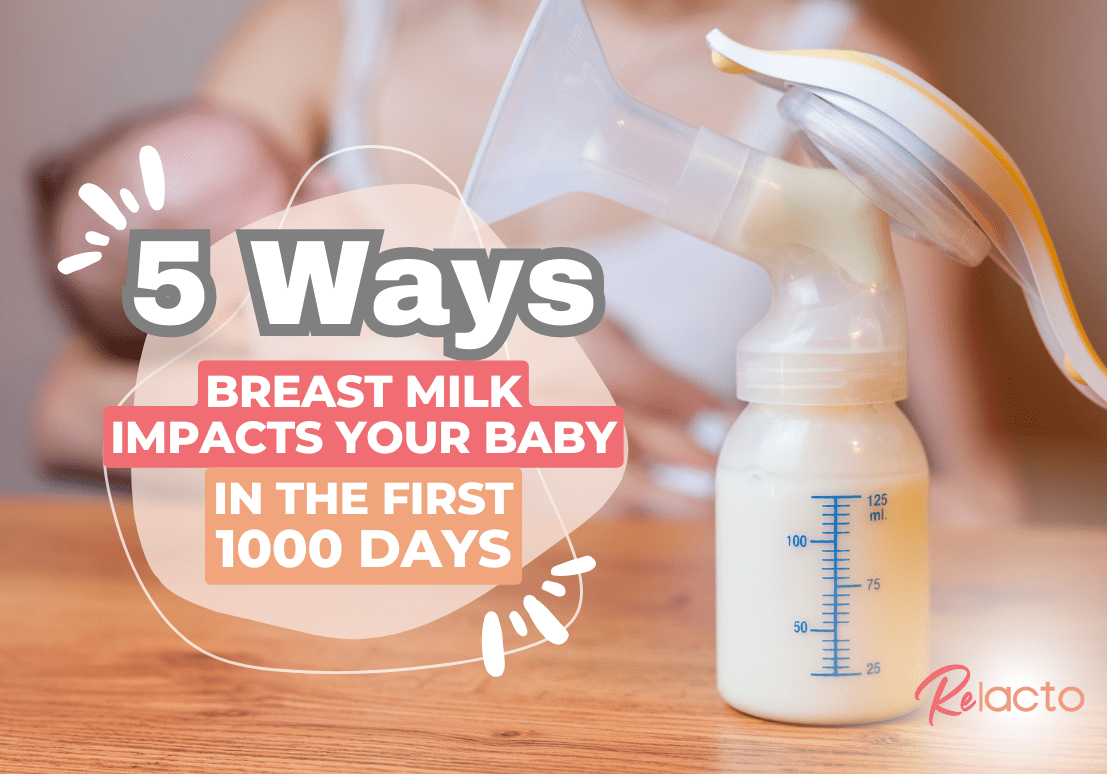5 Ways Breast Milk Impacts Your Baby in the First 1000 Days

Breast milk is often hailed as “liquid gold” for babies and for good reason. It is a remarkable substance that provides essential nutrients and immune-boosting properties to newborns and infants. The first 1000 days of a child’s life, starting from conception until the age of two, are crucial for their growth and development. During this critical period, breast milk plays a vital role in shaping a baby’s health and well-being. Let’s explore five key ways breast milk impacts your baby during these formative years.
Complete Nutrition
Breast milk is the perfect food for infants, offering a unique blend of nutrients that are tailored to meet their specific needs. It contains an ideal balance of carbohydrates, proteins, and fats, along with vitamins, minerals, and enzymes. These components promote optimal growth and development, providing everything a baby requires during the first six months of life. Breast milk even adapts its composition as the baby grows, ensuring they receive adequate nourishment at each stage.
Breast milk is rich in antibodies, which are passed on from the mother to the baby, providing passive immunity. These antibodies help protect the baby from a wide range of infections and diseases, especially during the early months when their immune system is still developing. Breastfed babies have a lower risk of respiratory infections, gastrointestinal illnesses, ear infections, and allergies. The antibodies present in breast milk also support the baby’s own immune system, laying the foundation for a robust defence mechanism in the long run.
Enhanced Immunity
Breast milk is a powerhouse of antibodies, white blood cells, and other immune-boosting substances. It is rich in oligosaccharides, a type of complex carbohydrate that acts as a prebiotic. Prebiotics promote the growth of beneficial bacteria in the baby’s gut, known as probiotics. This symbiotic relationship between prebiotics and probiotics helps establish a healthy gut microbiome, which plays a crucial role in immune system development. A balanced and diverse gut microbiome enhances the baby’s immune response, reduces the risk of allergic conditions, and strengthens overall immune function.
Aside from that, breast milk contains immune cells, such as lymphocytes and macrophages, which actively work to defend the baby against harmful bacteria, viruses, and other pathogens. These cells provide an added layer of defence, constantly surveilling and fighting off potential threats to the baby’s health.

Cognitive Development
The benefits of breast milk extend beyond physical health. Research suggests that breastfeeding may contribute to improved cognitive development in infants. The essential fatty acids present in breast milk, such as docosahexaenoic acid (DHA), are critical for brain growth and function. Studies have linked breastfeeding to higher IQ scores, better language and cognitive abilities, and improved academic performance later in life. The bonding and interaction that occur during breastfeeding also play a role in cognitive and emotional development.
Furthermore, breast milk contains various bioactive compounds, including hormones, growth factors, and cytokines, that support brain development and function. These substances aid in the formation of neural connections and help regulate the baby’s mood, behaviour, and stress response.
Reduced Risk of Chronic Conditions
Breastfeeding has been associated with a lower risk of several chronic conditions that can affect infants later in life. Breastfed babies have a decreased likelihood of developing obesity, type 2 diabetes and possibly asthma to name a few. The precise mechanisms behind these protective effects are still being explored, but breast milk’s unique composition and the positive influence it has on metabolism and immune function are believed to contribute to these long-term health benefits.
Emotional Bonding and Development
Breastfeeding promotes a strong emotional bond between mother and baby. The physical closeness, skin-to-skin contact, and eye contact during breastfeeding foster feelings of love, security, and trust. These early nurturing experiences have a profound impact on the baby’s emotional development and overall well-being. Breastfeeding also helps regulate the baby’s stress response and promotes the release of oxytocin, a hormone that enhances maternal-infant bonding.
The emotional connection established during breastfeeding provides a sense of comfort and reassurance to the baby, promoting healthy social and emotional development. This bond continues to strengthen as the baby grows, laying the foundation for secure attachments and positive relationships in the future.
Conclusion – Foods to increase breast milk
Now that we understand how impactful breast milk is for a baby, taking foods to boost milk supply is the next step. It may come as a surprise that plenty of household foods and ingredients are galactagogues. Among foods to increase milk supply are ginger, garlic, oatmeal, and black beans, to name a few. But you may want to explore other foods to increase breast milk such as fennel, fenugreek seeds, mulberry, and black dates.
If you are overwhelmed by the food, not to worry. ReLacto offers a variety of dishes meant to boost lactation. Some of our dishes are Baked Salmon Fillet with Ginger Mirin Sauce, Lactating Tofu Skin Fish Soup, and Applewood Smoked Pork Meatballs, all of which incorporate breast milk-boosting ingredients. If all those sound good to you, head on over to our menu to find out more!







